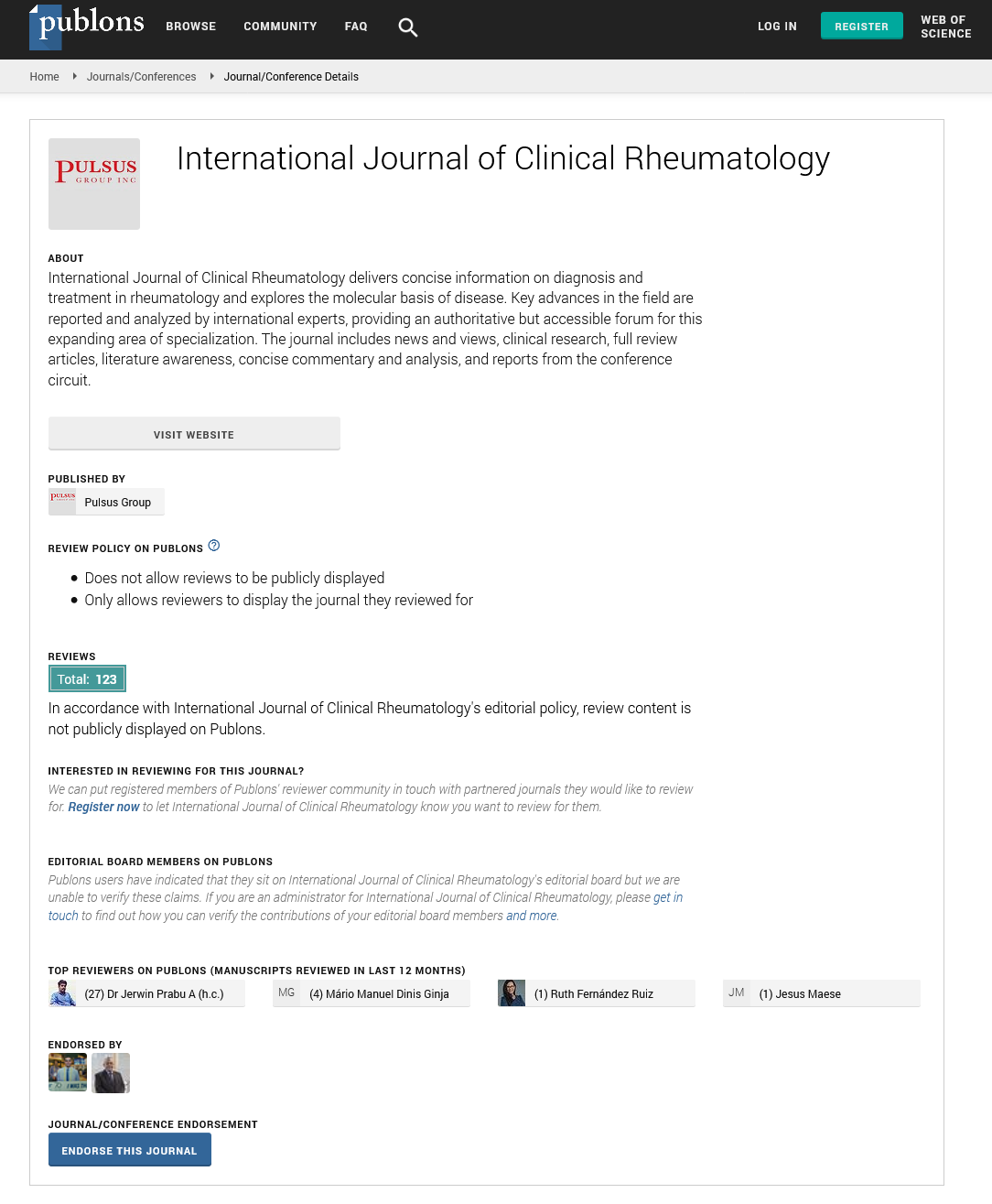Opinion Article - International Journal of Clinical Rheumatology (2022) Volume 17, Issue 8
One Third of Knee Replacements Classified as Inappropriate
Rebecca E. Sadun*,
Division of Rheumatology, Duke University Medical Center, Durham, NC, USA
- *Corresponding Author:
- Rebecca E. Sadun*
Division of Rheumatology, Duke University Medical Center, Durham, NC, USA
E-mail: rebecca.sadun@duke.edu
Received: 08-Aug-2022, Manuscript No. IJCR-22-139; Editor assigned: 09-Aug-2022, PreQC No. IJCR-22-139(PQ); Reviewed: 22- Aug-2022, QC No. IJCR-22-139; Revised: 27-Aug-2022, Manuscript No. IJCR-22- 139(R); Published: 02-Sep-2022; DOI: 10.37532/1758-4272.2022.17(8).139-140
Abstract
Introduction
New research reports that more than one third of total knee replacements in the U.S. were classified as "inappropriate" using a patient classification system developed and validated in Spain. Highlights the need for consensus on patient selection criteria among U.S. medical professionals treating those with the potential need of knee replacement surgery [1].
The Agency for Healthcare Research and Quality reports more than 600,000 knee replacements are performed in the U.S. each year. In the past 15 years, the use of total knee arthroplasty has grown significantly, with studies showing an annual volume increase of 162% in Medicare-covered knee replacement surgeries between 1991 and 2010. Some experts believe the growth is due to use of an effective procedure, while others contend there is over-use of the surgery that relies on subjective criteria [2].
Description
The present study, examined the criteria used to determine the appropriateness of total knee arthroplasties. To my knowledge, ours is the first U.S. study to compare validated appropriateness criteria with actual cases of knee replacement surgery.
A modified version of the appropriateness classification system developed along with the Western Ontario and McMaster Universities Arthritis Index (WOMAC) Pain and Physical Function scales were used to assess participants enrolled in the Osteoarthritis Initiative - a prospective 5-year study funded in part by the National Institutes of Health (NIH) [3].There were 175 subjects who underwent total knee replacement surgery, and were classified as appropriate, inconclusive, or inappropriate [4].
The mean age of knee replacement patients was 67 years and 60% of the group was female. Analyses show that 44% of surgeries were classified as appropriate, 22% as inconclusive, and 34% deemed inappropriate. The characteristics of patients undergoing surgery were varied [5].
Conclusion
Our finding that one third of knee replacements were inappropriate was higher than expected and linked to variation in knee pain OA severity and functional loss. These data highlight the need to develop patient selection criteria in the U.S.
References
- Riddle DL, Jiranek WA, Hayes CW. Use of a validated algorithm to judge the appropriateness of total knee arthroplasty in the United States: a multicenter longitudinal cohort study. Arthritis Rheumatol. 66(8), 2134-2143 (2014).
- Van Walraven CV, Paterson JM, Kapral M et al. Appropriateness of primary total hip and knee replacements in regions of Ontario with high and low utilization rates. CMAJ. 155(6), 697 (1996).
- Ghomrawi HMK, Mushlin AI, Kang R et al. Examining timeliness of total knee replacement among patients with knee osteoarthritis in the US: results from the OAI and MOST longitudinal cohorts. J Bone Joint Surg Am. 102(6), 468 (2020).
- Escobar A, Quintana JM, Aróstegui I et al. Development of explicit criteria for total knee replacement. Int J Technol Assess Health Care. 19(1), 57-70 (2003).
- Julin J, Jämsen E, Puolakka T et al. Younger age increases the risk of early prosthesis failure following primary total knee replacement for osteoarthritis: a follow-up study of 32,019 total knee replacements in the Finnish Arthroplasty Register. Acta Orthop. 81(4), 413-419 (2003).
Indexed at, Google Scholar, Crossref
Indexed at, Google Scholar, Crossref
Indexed at, Google Scholar, Crossref


